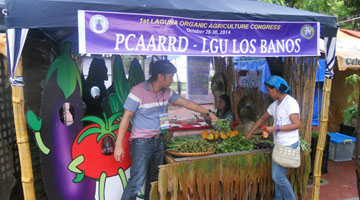 Organic vegetable produce of farmer-cooperators in a project funded by DOST’s Philippine Council for Agriculture, Aquatic and Natural Resources Research and Development (PCAARRD) was showcased in the recently concluded First Laguna Organic Agriculture Congress held at the Cultural Center of Sta. Cruz, Laguna.
Organic vegetable produce of farmer-cooperators in a project funded by DOST’s Philippine Council for Agriculture, Aquatic and Natural Resources Research and Development (PCAARRD) was showcased in the recently concluded First Laguna Organic Agriculture Congress held at the Cultural Center of Sta. Cruz, Laguna.
Anchored on a gender-sensitivity initiative, the project concerns organic vegetable production as a livelihood option, particularly for low-income communities of Los Baños, Laguna.
The Congress themed “Sa Organiko Panalo Tayo, kayat Lagunenyo para sa iyo ito,” was organized by the Office of the Provincial Agriculturist in partnership with Region IV-A Agricultural Training Institute.
Organic vegetables such as “sitao,” “patola,” “okra,” “kangkong,” “ampalaya,” squash, lettuce, and eggplant were among the vegetables grown by farmer-cooperators from the villages of Putho-Tuntungin, Bagong Silang, Timugan, Lalakay, and Maahas. The organic farming technologies used in growing these vegetables are products of the research and development undertakings of another PCAARRD-funded National R&D Program on Organic Vegetables completed recently.
Farmer-cooperators underwent a series of trainings on the production of natural farm inputs, compost production, pest and disease management, and held cross visits to successful farms, before establishing their own production plots. Aside from selling their harvests at the Congress, the farmer-cooperators have also started marketing their produce at the Herb Republic Restaurant of Los Banos, Laguna. This PCAARRD-funded project is being implemented by the Gender and Development Office of the Los Baños municipality.
Aside from featuring organic agriculture initiatives In Laguna, the Congress also aimed to raise public consciousness on the importance of women involvement in agriculture. According to Ms. Karen Mercado, Project Leader and GAD Officer of LGU-LB, the organic vegetable production project not only provided additional income to farmer-cooperators. It also enabled women in the villages to become productive by using more of their free time in farm activities. Organic farming practices are women-friendly unlike the conventional farming practices, which are usually male-dominated.
